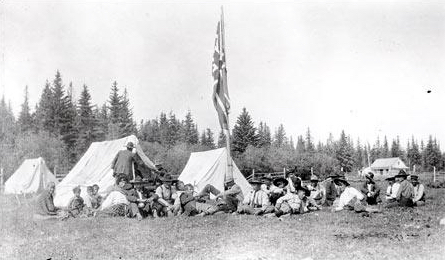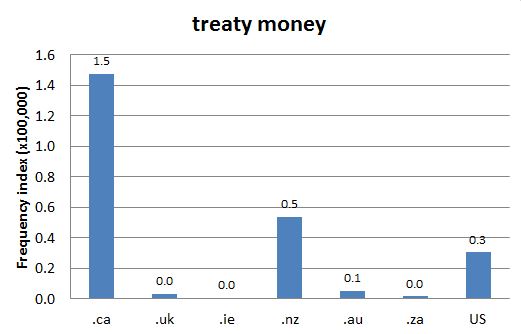DCHP-2
treaty money Treaty Money, Treaty money DCHP-2 (July 2016)
n. — First Nations
an annual cash payment mandated by some treaties between First Nations and the Canadian government.
Type: 4. Culturally Significant — The term treaty money refers to the sum of money (see the 1872 and 1894 quotations) paid annually by the Canadian federal government to members of First Nations that signed historic treaties (see treaty) with the federal government (see the 1965 quotation) or have certain affiliations with Treaty First Nations (see AANDC reference). Historically distributed on Treaty Day (see Image 1), alongside items such as ammunition, hunting or fishing equipment and food, treaty money is generally a sum of just $5.00 (see the 1999 quotation) that is "now paid directly" (see Canadian Encyclopedia, s.v. "Treaty Day") under the formal classification of treaty annuity (see treaty annuity). In the 19th century this amount was equivalent to the price of five acres of land. Today, as a result of inflation, the sum will barely buy an ice cream cone. Calls that the contract implied by treaty money payments should be "honoured, at current values" (see the 2013 quotation) have so far gone unanswered. The term is most frequent in, but not exclusive to, Canada (see Chart 1).
Regardless of the sum, the payment of treaty money is usually integrated into some kind of celebration, such as a reconciliation event (see the 2012 quotation), that is "held annually on or off reserve" (see AANDC reference). Thus, treaty money is symbolic of the relationship between First Nations and the Crown.See also: Indian (meaning 1b) Indian Register Indian treaty (def. 2) treaty (meanings 2, 3, 4) treaty annuity treaty Indian treaty payment (def. 1)
References:
- AANDC "Treaty Annuity Payments " Accessed 21 May 2014
- Canadian Encyclopedia "Treaty Day" Accessed 28 Jul. 2016
Images:

Image 1: Chipewyan (Denesuline) people receiving treaty money under Treaty 8 in Portage La Loche, Saskatchewan, circa 1911. The HBC residence is shown on the top right. Source: Wikimedia Commons. Photo: Unknown
Chart 1: Internet Domain Search, 20 May 2014
